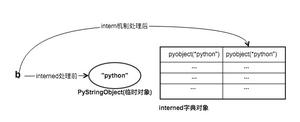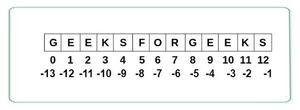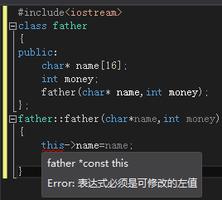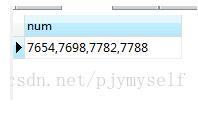python基础知识-字符串

字符串:
赋值方法
a = 'name'
a = str('name')
字符串的方法:
1 #!/usr/bin/env python2 class str(object):
3 """
4 str(object='') -> str
5 str(bytes_or_buffer[, encoding[, errors]]) -> str
6
7 Create a new string object from the given object. If encoding or
8 errors is specified, then the object must expose a data buffer
9 that will be decoded using the given encoding and error handler.
10 Otherwise, returns the result of object.__str__() (if defined)
11 or repr(object).
12 encoding defaults to sys.getdefaultencoding().
13 errors defaults to 'strict'.
14 """
15 def capitalize(self): # real signature unknown; restored from __doc__
16 '''首字母大写'''
17 """
18 S.capitalize() -> str
19
20 Return a capitalized version of S, i.e. make the first character
21 have upper case and the rest lower case.
22 """
23 return ""
24
25 def casefold(self): # real signature unknown; restored from __doc__
26 '''全部转换为小写'''
27 """
28 S.casefold() -> str
29
30 Return a version of S suitable for caseless comparisons.
31 """
32 return ""
33
34 def center(self, width, fillchar=None): # real signature unknown; restored from __doc__
35 '''内容居中,width:总长度,fillchar:空白处填充内容,默认无'''
36 """
37 S.center(width[, fillchar]) -> str
38
39 Return S centered in a string of length width. Padding is
40 done using the specified fill character (default is a space)
41 """
42 return ""
43
44 def count(self, sub, start=None, end=None): # real signature unknown; restored from __doc__
45 '''子序列个数'''
46 """
47 S.count(sub[, start[, end]]) -> int
48
49 Return the number of non-overlapping occurrences of substring sub in
50 string S[start:end]. Optional arguments start and end are
51 interpreted as in slice notation.
52 """
53 return 0
54
55 def encode(self, encoding='utf-8', errors='strict'): # real signature unknown; restored from __doc__
56 '''编码,针对unicode'''
57 """
58 S.encode(encoding='utf-8', errors='strict') -> bytes
59
60 Encode S using the codec registered for encoding. Default encoding
61 is 'utf-8'. errors may be given to set a different error
62 handling scheme. Default is 'strict' meaning that encoding errors raise
63 a UnicodeEncodeError. Other possible values are 'ignore', 'replace' and
64 'xmlcharrefreplace' as well as any other name registered with
65 codecs.register_error that can handle UnicodeEncodeErrors.
66 """
67 return b""
68
69 def endswith(self, suffix, start=None, end=None): # real signature unknown; restored from __doc__
70 '''判断是否以特定值结尾,也可以是一个元组。如果是则为真(True)'''
71 """
72 S.endswith(suffix[, start[, end]]) -> bool
73
74 Return True if S ends with the specified suffix, False otherwise.
75 With optional start, test S beginning at that position.
76 With optional end, stop comparing S at that position.
77 suffix can also be a tuple of strings to try.
78 """
79 return False
80
81 def expandtabs(self, tabsize=8): # real signature unknown; restored from __doc__
82 '''将一个tab键转换为空格,默认为8个空格'''
83 """
84 S.expandtabs(tabsize=8) -> str
85
86 Return a copy of S where all tab characters are expanded using spaces.
87 If tabsize is not given, a tab size of 8 characters is assumed.
88 """
89 return ""
90
91 def find(self, sub, start=None, end=None): # real signature unknown; restored from __doc__
92 '''寻找子序列的位置,如果没有找到则返回 -1,只查找一次找到及返回 '''
93 """
94 S.find(sub[, start[, end]]) -> int
95
96 Return the lowest index in S where substring sub is found,
97 such that sub is contained within S[start:end]. Optional
98 arguments start and end are interpreted as in slice notation.
99
100 Return -1 on failure.
101 """
102 return 0
103
104 def format(*args, **kwargs): # known special case of str.format
105 '''字符串格式转化'''
106 """
107 S.format(*args, **kwargs) -> str
108
109 Return a formatted version of S, using substitutions from args and kwargs.
110 The substitutions are identified by braces ('{' and '}').
111 """
112 pass
113
114 def format_map(self, mapping): # real signature unknown; restored from __doc__
115 """
116 S.format_map(mapping) -> str
117
118 Return a formatted version of S, using substitutions from mapping.
119 The substitutions are identified by braces ('{' and '}').
120 """
121 return ""
122
123 def index(self, sub, start=None, end=None): # real signature unknown; restored from __doc__
124 '''子序列的位置,如果没有找到返回错误'''
125 """
126 S.index(sub[, start[, end]]) -> int
127
128 Like S.find() but raise ValueError when the substring is not found.
129 """
130 return 0
131
132 def isalnum(self): # real signature unknown; restored from __doc__
133 '''是否是字母或数字'''
134 """
135 S.isalnum() -> bool
136
137 Return True if all characters in S are alphanumeric
138 and there is at least one character in S, False otherwise.
139 """
140 return False
141
142 def isalpha(self): # real signature unknown; restored from __doc__
143 '''是否所有字符都为字母'''
144 """
145 S.isalpha() -> bool
146
147 Return True if all characters in S are alphabetic
148 and there is at least one character in S, False otherwise.
149 """
150 return False
151
152 def isdecimal(self): # real signature unknown; restored from __doc__
153 '''是否为十进制数'''
154 """
155 S.isdecimal() -> bool
156
157 Return True if there are only decimal characters in S,
158 False otherwise.
159 """
160 return False
161
162 def isdigit(self): # real signature unknown; restored from __doc__
163 '''是否所有字符都为数字'''
164 """
165 S.isdigit() -> bool
166
167 Return True if all characters in S are digits
168 and there is at least one character in S, False otherwise.
169 """
170 return False
171
172 def isidentifier(self): # real signature unknown; restored from __doc__
173 '''是否为有效标识符'''
174 """
175 S.isidentifier() -> bool
176
177 Return True if S is a valid identifier according
178 to the language definition.
179
180 Use keyword.iskeyword() to test for reserved identifiers
181 such as "def" and "class".
182 """
183 return False
184
185 def islower(self): # real signature unknown; restored from __doc__
186 '''是否所有字符都为小写'''
187 """
188 S.islower() -> bool
189
190 Return True if all cased characters in S are lowercase and there is
191 at least one cased character in S, False otherwise.
192 """
193 return False
194
195 def isnumeric(self): # real signature unknown; restored from __doc__
196 '''是否只有数字'''
197 """
198 S.isnumeric() -> bool
199
200 Return True if there are only numeric characters in S,
201 False otherwise.
202 """
203 return False
204
205 def isprintable(self): # real signature unknown; restored from __doc__
206 '''内容是否都是可见的字符,不可见的包括tab键,换行符。空格为可见字符'''
207 """
208 S.isprintable() -> bool
209
210 Return True if all characters in S are considered
211 printable in repr() or S is empty, False otherwise.
212 """
213 return False
214
215 def isspace(self): # real signature unknown; restored from __doc__
216 '''是否只有空格组成'''
217 """
218 S.isspace() -> bool
219
220 Return True if all characters in S are whitespace
221 and there is at least one character in S, False otherwise.
222 """
223 return False
224
225 def istitle(self): # real signature unknown; restored from __doc__
226 '''是否为标题化的'''
227 """
228 S.istitle() -> bool
229
230 Return True if S is a titlecased string and there is at least one
231 character in S, i.e. upper- and titlecase characters may only
232 follow uncased characters and lowercase characters only cased ones.
233 Return False otherwise.
234 """
235 return False
236
237 def isupper(self): # real signature unknown; restored from __doc__
238 '''是否都为大写字母'''
239 """
240 S.isupper() -> bool
241
242 Return True if all cased characters in S are uppercase and there is
243 at least one cased character in S, False otherwise.
244 """
245 return False
246
247 def join(self, iterable): # real signature unknown; restored from __doc__
248 '''连接,以S作为分隔符,把所有iterable中的元素合并成一个新的字符串'''
249 """
250 S.join(iterable) -> str
251
252 Return a string which is the concatenation of the strings in the
253 iterable. The separator between elements is S.
254 """
255 return ""
256
257 def ljust(self, width, fillchar=None): # real signature unknown; restored from __doc__
258 '''左对齐,width 字符串的长度,右侧以fillchar填充,默认为空'''
259 """
260 S.ljust(width[, fillchar]) -> str
261
262 Return S left-justified in a Unicode string of length width. Padding is
263 done using the specified fill character (default is a space).
264 """
265 return ""
266
267 def lower(self): # real signature unknown; restored from __doc__
268 '''所有字母大写变小写,返回一个小写的副本'''
269 """
270 S.lower() -> str
271
272 Return a copy of the string S converted to lowercase.
273 """
274 return ""
275
276 def lstrip(self, chars=None): # real signature unknown; restored from __doc__
277 '''去除左侧空白'''
278 """
279 S.lstrip([chars]) -> str
280
281 Return a copy of the string S with leading whitespace removed.
282 If chars is given and not None, remove characters in chars instead.
283 """
284 return ""
285
286 def maketrans(self, *args, **kwargs): # real signature unknown
287 """
288 Return a translation table usable for str.translate().
289
290 If there is only one argument, it must be a dictionary mapping Unicode
291 ordinals (integers) or characters to Unicode ordinals, strings or None.
292 Character keys will be then converted to ordinals.
293 If there are two arguments, they must be strings of equal length, and
294 in the resulting dictionary, each character in x will be mapped to the
295 character at the same position in y. If there is a third argument, it
296 must be a string, whose characters will be mapped to None in the result.
297 """
298 pass
299
300 def partition(self, sep): # real signature unknown; restored from __doc__
301 '''分割,把字符以sep分割为 前 中 后 三个部分'''
302 """
303 S.partition(sep) -> (head, sep, tail)
304
305 Search for the separator sep in S, and return the part before it,
306 the separator itself, and the part after it. If the separator is not
307 found, return S and two empty strings.
308 """
309 pass
310
311 def replace(self, old, new, count=None): # real signature unknown; restored from __doc__
312 '''替换,old替换为new,可以指定次数(count)'''
313 """
314 S.replace(old, new[, count]) -> str
315
316 Return a copy of S with all occurrences of substring
317 old replaced by new. If the optional argument count is
318 given, only the first count occurrences are replaced.
319 """
320 return ""
321 ###########################################################
322 #所有以r开头和上面一样的方法,都和上面反方向(即从右到左)#
323 ###########################################################
324 def rfind(self, sub, start=None, end=None): # real signature unknown; restored from __doc__
325 """
326 S.rfind(sub[, start[, end]]) -> int
327
328 Return the highest index in S where substring sub is found,
329 such that sub is contained within S[start:end]. Optional
330 arguments start and end are interpreted as in slice notation.
331
332 Return -1 on failure.
333 """
334 return 0
335
336 def rindex(self, sub, start=None, end=None): # real signature unknown; restored from __doc__
337 """
338 S.rindex(sub[, start[, end]]) -> int
339
340 Like S.rfind() but raise ValueError when the substring is not found.
341 """
342 return 0
343
344 def rjust(self, width, fillchar=None): # real signature unknown; restored from __doc__
345 """
346 S.rjust(width[, fillchar]) -> str
347
348 Return S right-justified in a string of length width. Padding is
349 done using the specified fill character (default is a space).
350 """
351 return ""
352
353 def rpartition(self, sep): # real signature unknown; restored from __doc__
354 """
355 S.rpartition(sep) -> (head, sep, tail)
356
357 Search for the separator sep in S, starting at the end of S, and return
358 the part before it, the separator itself, and the part after it. If the
359 separator is not found, return two empty strings and S.
360 """
361 pass
362
363 def rsplit(self, sep=None, maxsplit=-1): # real signature unknown; restored from __doc__
364 """
365 S.rsplit(sep=None, maxsplit=-1) -> list of strings
366
367 Return a list of the words in S, using sep as the
368 delimiter string, starting at the end of the string and
369 working to the front. If maxsplit is given, at most maxsplit
370 splits are done. If sep is not specified, any whitespace string
371 is a separator.
372 """
373 return []
374
375 def rstrip(self, chars=None): # real signature unknown; restored from __doc__
376 """
377 S.rstrip([chars]) -> str
378
379 Return a copy of the string S with trailing whitespace removed.
380 If chars is given and not None, remove characters in chars instead.
381 """
382 return ""
383
384 def split(self, sep=None, maxsplit=-1): # real signature unknown; restored from __doc__
385 '''分割,以什么分割,maxsplit分割次数'''
386 """
387 S.split(sep=None, maxsplit=-1) -> list of strings
388
389 Return a list of the words in S, using sep as the
390 delimiter string. If maxsplit is given, at most maxsplit
391 splits are done. If sep is not specified or is None, any
392 whitespace string is a separator and empty strings are
393 removed from the result.
394 """
395 return []
396
397 def splitlines(self, keepends=None): # real signature unknown; restored from __doc__
398 '''根据换行符分割'''
399 """
400 S.splitlines([keepends]) -> list of strings
401
402 Return a list of the lines in S, breaking at line boundaries.
403 Line breaks are not included in the resulting list unless keepends
404 is given and true.
405 """
406 return []
407
408 def startswith(self, prefix, start=None, end=None): # real signature unknown; restored from __doc__
409 '''是否以self起始,可以指定开始和结束位置'''
410 """
411 S.startswith(prefix[, start[, end]]) -> bool
412
413 Return True if S starts with the specified prefix, False otherwise.
414 With optional start, test S beginning at that position.
415 With optional end, stop comparing S at that position.
416 prefix can also be a tuple of strings to try.
417 """
418 return False
419
420 def strip(self, chars=None): # real signature unknown; restored from __doc__
421 '''移除两边空白'''
422 """
423 S.strip([chars]) -> str
424
425 Return a copy of the string S with leading and trailing
426 whitespace removed.
427 If chars is given and not None, remove characters in chars instead.
428 """
429 return ""
430
431 def swapcase(self): # real signature unknown; restored from __doc__
432 '''大小写反转'''
433 """
434 S.swapcase() -> str
435
436 Return a copy of S with uppercase characters converted to lowercase
437 and vice versa.
438 """
439 return ""
440
441 def title(self): # real signature unknown; restored from __doc__
442 '''标题化,即首字母大写其余字母为小写'''
443 """
444 S.title() -> str
445
446 Return a titlecased version of S, i.e. words start with title case
447 characters, all remaining cased characters have lower case.
448 """
449 return ""
450
451 def translate(self, table): # real signature unknown; restored from __doc__
452 '''转换,需要做一个对应表,删除的放到最后面'''
453 """
454 S.translate(table) -> str
455
456 Return a copy of the string S in which each character has been mapped
457 through the given translation table. The table must implement
458 lookup/indexing via __getitem__, for instance a dictionary or list,
459 mapping Unicode ordinals to Unicode ordinals, strings, or None. If
460 this operation raises LookupError, the character is left untouched.
461 Characters mapped to None are deleted.
462 """
463 return ""
464
465 def upper(self): # real signature unknown; restored from __doc__
466 '''小写字母转换为大写'''
467 """
468 S.upper() -> str
469
470 Return a copy of S converted to uppercase.
471 """
472 return ""
473
474 def zfill(self, width): # real signature unknown; restored from __doc__
475 '''返回width长度的字符串,原字符串右对齐,前面填充 0 '''
476 """
477 S.zfill(width) -> str
478
479 Pad a numeric string S with zeros on the left, to fill a field
480 of the specified width. The string S is never truncated.
481 """
482 return ""
str
示例:
####
capitalize()
>>> name = 'binges wang'
>>> name.capitalize()
'Binges wang'
####
casefold()
>>> name = 'Binges Wang'
>>> name.casefold()
'binges wang'
####
center()
>>> name = 'binges'
>>> name.center(10)
' binges '
>>> name.center(10,'#')
'##binges##'
####
endswith()
>>> name = 'binges'
>>> name.endswith('s')
True
>>> name.endswith('es')
True
>>> name.endswith('ed')
False
####
find()
>>> name = 'binges wang'
>>> name.find('s')
5
>>> name.find('x')
-1
>>> name.find('g')
3
>>> name.find('an')
8
####
index()
>>> name = 'binges wang'
>>> name.index('a')
8
>>> name.index('s')
5
>>> name.index('an')
8
>>> name.index('x')
Traceback (most recent call last):
File "<stdin>", line 1, in <module>
ValueError: substring not found
####
isalnum()
>>> name = 'binges'
>>> name.isalnum()
True
>>> name = 'binges 12'
>>> name.isalnum()
False
>>> name = 'binges12'
>>> name.isalnum()
True
>>> age = '12'
>>> age.isalnum()
True
####
isalpha()
>>> name = 'binges12'
>>> name.isalpha()
False
>>> name = 'binges wang'
>>> name.isalpha()
False
>>> name = 'binges'
>>> name.isalpha()
True
####
isdigit()
>>> age = '23'
>>> age.isdigit()
True
>>> age = '23 '
>>> age.isdigit()
False
>>> age = '23.5'
>>> age.isdigit()
False
####
isidentifier()
>>> name = 'binges wang'
>>> name.isidentifier()
False
>>> name = 'binges'
>>> name.isidentifier()
True
####
islower()
>>> name = 'binges'
>>> name.islower()
True
>>> name = 'binges wang'
>>> name.islower()
True
>>> name = 'binges 12'
>>> name.islower()
True
>>> name = 'binges Wang'
>>> name.islower()
False
####
isprintable()
>>> name = 'binges wang'
>>> name.isprintable()
False
>>> name = 'binges wang'
>>> name.isprintable()
True
>>> name = 'binges\nwang'
>>> name.isprintable()
False
####
isspace()
>>> name = ' ' #两个空格
>>> name.isspace()
True
>>> name = ' ' #一个tab键
>>> name.isspace()
True
>>> name = 'bings wang'
>>> name.isspace()
False
####
istitle()
>>> name = 'binges wang'
>>> name.istitle()
False
>>> name = 'Binges wang'
>>> name.istitle()
False
>>> name = 'Binges Wang'
>>> name.istitle()
True
####
isupper()
>>> name = 'BINGEs'
>>> name.isupper()
False
>>> name = 'BINGES'
>>> name.isupper()
True
>>> name = 'BINGES WANG'
>>> name.isupper()
True
####
join()
>>> a = ' ' #一个空格
>>> a.join(b)
'b i n g e s'
####
ljust()
>>> name = 'binges'
>>> name.ljust(10)
'binges '
>>> name.ljust(10,'&')
'binges&&&&'
####
lower()
>>> name = 'BinGes WanG'
>>> name.lower()
'binges wang'
>>> name
'BinGes WanG'
####
lstrip()
>>> name = ' binges wang' #一个空格和一个tab键
>>> name.lstrip()
'binges wang'
####
partition('n')
>>> name = 'binges wang'
>>> name.partition('n')
('bi', 'n', 'ges wang')
####
replace()
>>> name = 'binges wang'
>>> name.replace('n','w')
'biwges wawg'
>>> name
'binges wang'
>>> name.replace('n','w',1)
'biwges wang'
####
startswith()
>>> name = 'binges'
>>> name.startswith('b')
True
>>> name.startswith('bd')
False
>>> name.startswith('n',1,5)
False
>>> name.startswith('n',2,5)
True
####
split()
>>> name = 'binges'
>>> name.split('n')
['bi', 'ges']
>>> name = 'binges wang'
>>> name.split('n')
['bi', 'ges wa', 'g']
>>> name.split('n',1)
['bi', 'ges wang']
####
strip()
>>> name = ' binges wang ' #空白处都为一个空格和一个tab键
>>> name.strip()
'binges \twang'
####
swapcase()
>>> name = 'BinGes WanG'
>>> name.swapcase()
'bINgES wANg'
####
title()
>>> name = 'BinGes WanG'
>>> name.title()
'Binges Wang'
####
upper()
>>> name
'BinGes WanG'
>>> name.upper()
'BINGES WANG'
####
zfill(10)
>>> name = 'binges'
>>> name.zfill(10)
'0000binges'
####
以上是 python基础知识-字符串 的全部内容, 来源链接: utcz.com/z/389207.html








